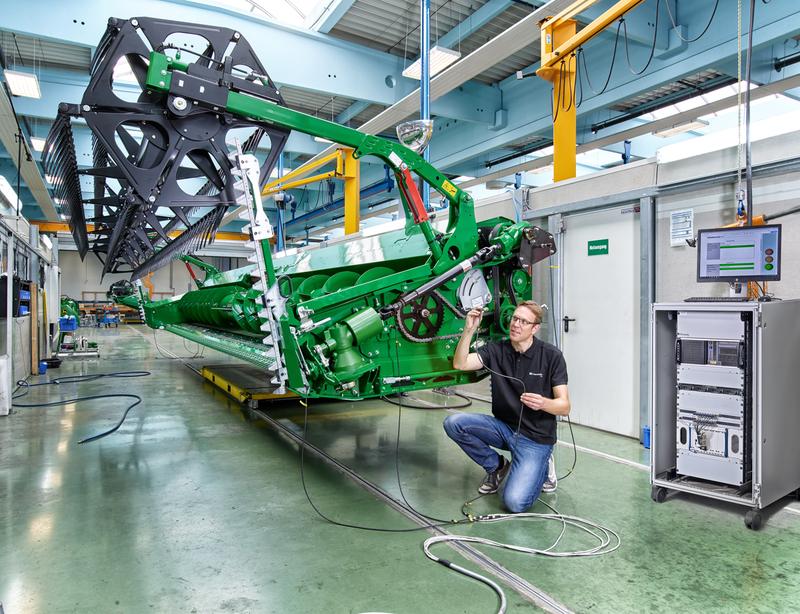
A sensor system learns to "hear": Reliable detection of failures in machines and systems

The sensor system inspects the rotating cutting unit of a combine harvester for defective vibrations or noises.
Fraunhofer IZFP / Uwe Bellhäuser
In the event that large-scale machines or plants are already in operation, defects or defectively assembled components may result in malfunction of machines and thus in production shutdown and economic loss.
Hence, the quality assurance previous to launch and after the final check of plants or machines is crucial. But what possibilities exist to reliably verify the correct assembly and function of plants or machines without great effort?
Fraunhofer IZFP researchers have intensely engaged in this topic and have developed an inspection solution that provides objective results plus the capacity for permanent quality monitoring of moving or rotating machines and plants.
Reliable failure detection without lavish calibration
In operation, machines and plants generate characteristic vibrations and therefore noises: These noises provide information on the quality since defective mounting or other defects often induce a change in the regular operating noises. Often, assembly personnel who have a good hearing and considerable experience are intrusted with this “inspection task”.
However, the human ear is subject to a certain subjectivity: It gets tired after a while and is unfavorably influenced by environmental noises. On the other hand, solutions available on the market often require an adaptation or a calibration, especially in case of even minor construction changes of the plants or machines to be inspected.
An intelligent and fast analysis procedure for multiple industrial fields of application
The AcoustiX sensor system exploits data of individually adjusted acoustic sensors which are directly attached to the machine; alternatively, microphones are used for contactless recording of vibrations or noises of machines or plants:
Failures or imperfections are automatically analyzed and finally logged. Based on the signal assessment, targeted statements on the correct installation and function of the plant or machine are available.
The “hearing” sensor system of the Fraunhofer researchers is not only designed for the control of cutting units but for multiple industrial applications.
The system can be used in all areas where final assembly control or permanent operation monitoring are crucial, e.g., to monitor huge autonomously operated machines and plants or to assess the quality of single assembly units used in test benches.
“The development zeroes in on our analytical methods, the algorithms. They are suited to be integrated in existing inspection lines and can be adapted to fit the individual needs of the customer“, explains Matthias Heinrich, scientist at Fraunhofer IZFP.
Currently, AcoustiX is successfully used at John Deere for the permanent quality monitoring of cutting units of combine harvesters in industrial application; parallel to this, it is currently being validated for series production.
The medium-term goal of the researchers is the precise failure localization as well as the detailled determination of the defect type by means of intelligent algorithms respectively analytical methods.
Matthias Heinrich | Fraunhofer Institute for Nondestructive Testing IZFP | Phone +49 681 9302-3638 | Campus E3 1 | 66123 Saarbrücken, Germany | www.izfp.fraunhofer.de | matthias.heinrich@izfp.fraunhofer.de
http://www.izfp.fraunhofer.de
https://www.facebook.com/FraunhoferIZFP/












